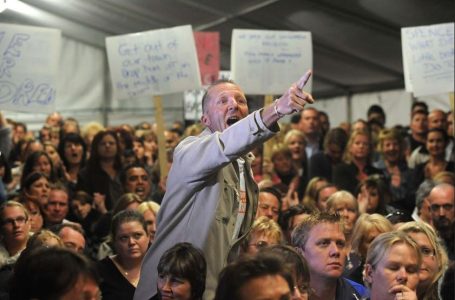Widgetized Section
Go to Admin » Appearance » Widgets » and move Gabfire Widget: Social into that MastheadOverlay zone
Is Unity Possible?
The views expressed are those of the author and do not necessarily reflect the views of ASPA as an organization.
By Ben Tafoya
September 20, 2024

Perhaps more important than inflation or unemployment, gas prices or immigration is the issue of the political divide that engulfs our public discussions at the federal, state and local levels. I wrote my last column about my retirement from full-time public service, what that meant to my life and my hope that it helped my neighbors here in Massachusetts. In addition to my employment as a public administrator, I have served as an elected official for the better part of twenty years. Over the years, I have seen a deterioration in public engagement that raises fears about whether people with a good heart may forgo the opportunity to serve in this manner.
Violence in the U.S. public sphere is very noticeable. The recent assassination attempt of a presidential candidate, the January 6 riots, the shooting of a senior leader in the House and the shooting of a Senator 13 years ago all resulted in the death or injury not just of the official but staff, law enforcement personnel and citizen bystanders. I am old enough to remember the assassinations of President John Kennedy, Senator Robert Kennedy and the Reverend Dr. Martin Luther King, Jr. Each of these actions had a traumatic impact on our politics that, to some extent or another, changed our nation’s course.
Considering this history, the last two centuries as a country are marked by similar periods. The worst was the Civil War, which was the culmination of decades of political conflict over the enslavement of Africans brought to these shores as chattel. The War preserved the Union, but the Reconstruction of the country and our democracy was cut short by the assassination of President Lincoln. The resulting era of Jim Crow lasted another century and saw over 3000 lynchings of African Americans throughout the country. Political violence took the lives of Presidents Garfield and McKinley, and attempts were made on the lives of both Roosevelts.
At the local level, we see the harassment of officials, particularly regarding the administration of elections. Public meetings descend into shouting matches between citizens and elected boards, police are called to restore order and public officials resign. Through the division and strife, the public’s work is pushed aside to settle grievances that are in part partisan political and in part personal. The same pattern marked the response to the pandemic and the efforts to protect public health in the face of an unprecedented threat.
It is concerning whether even compromise could make a difference. In terms of policy choices compromise can work either of two ways. First, we could split the difference between your position and mine. A second option is to give you this issue, and I get my preferred solution for the next one. The challenge with the first alternative is that splitting the difference does not necessarily mean the problem is solved. It could mean an ineffective solution that creates more frustration among the public. The challenge with the latter is that it requires trust between the factions (or parties) involved. Given the widely disparate views/ideologies that characterize the opposing sides in our current political conflict, the path may need to be more realistic. Incremental change, based on measured steps toward a shared goal, requires a common mind as to where we are headed.
Democracy is supposed to settle the issues. We vote for representatives, sometimes for items directly, that reveal the people’s will. Democracy assumes that all who want to participate in public life can do so freely. For the results to be legitimate, the process must be open and accessible. We all must be willing to live with the results, understanding that we have a constitutional right to petition for grievances when the government’s actions do not satisfy us.
We know that our democratic structure has flaws. The Electoral College, lack of representation for D.C. and Puerto Rico, gerrymandering, which is subject to uneven court decisions and campaign finance laws that favor the desires of the super-rich over everyone else are examples of problems that, in turn, leave some out of the system and frustrate the efforts of others to make change. The right to vote, campaign and respectfully advocate for our positions to elected and appointed officials gives us hope that a change will occur in our public discourse to allow for peaceful competition. We can reject the notion that unity requires agreement with whoever is in charge. However, this works only if we welcome the participation of all members of our society and decisions or elections are legitimized through that participation.
Author: Dr. Ben Tafoya, a retired public administrator, is an adjunct faculty member teaching economics at Northeastern University in Boston. Ben is the author of a chapter on social equity and public Administration in the volume from Birkdale, Public Affairs Practicum. He can be reached at [email protected] or on Threads at bentafoya . All opinions and mistakes are his alone.


Follow Us!